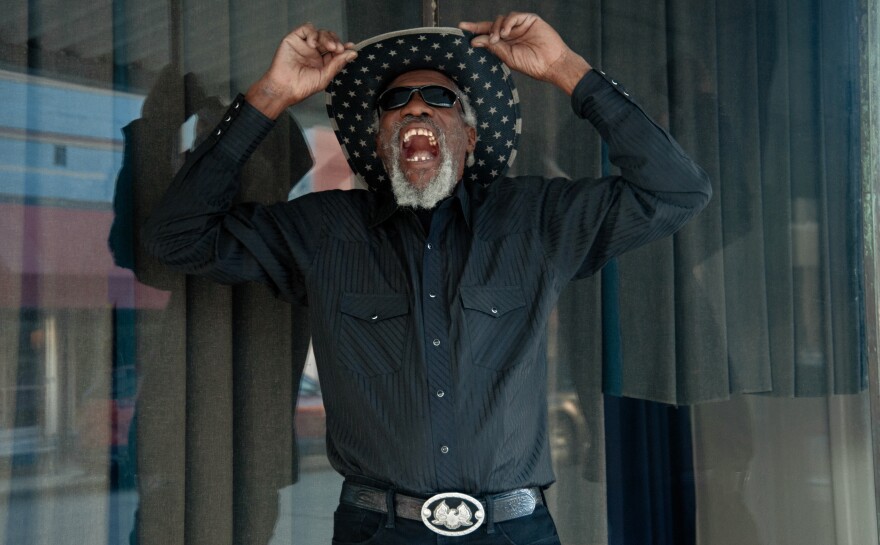There’s a lot of man between Robert Finley’s cowboy boots and the crown of his signature black cowboy hat almost seven feet above. When he gets in full swing on stage, his long legs and arms are in constant motion, gyrating amid a parade of greasy funk beats. He’s an absolutely magnetic figure, with a toothy smile and bright eyes despite the glaucoma blindness that ended one chapter of his life but in a way opened up a new one. He’s that rare delight - a great American roots musician - and a person living with a disability - who grabbed the world’s attention in his 60s.
“It's a childhood dream, so it don't seem like work when you're doing what you love to do,” says Finley of his busy tempo in Episode 263 of The String. “Even when we’re in the studio, it's so much fun you never really get tired. The only part that I sometimes don't like about it is the traveling.” And sure, there are sometimes canceled flights and traffic jams. But on the opening song of his latest album Black Bayou, Finley sings about “Living Out A Suitcase,” attracting the interest of pretty women and making crowds of thousands feel good. “What I like about it the most,” he sings, “Is the joy that I bring.”

A decade ago somebody looking in on the world of Robert Finley would have figured his life in music was going to end as it had been lived, as a regional musician making ends meet with a trade in construction. But losing his sight opened up doors, and now at age 69, Finley has found a record label that loves him - Nashville’s Easy Eye Sound - and a sustaining audience. He’ll spend the entire month of November in Europe, with plans to return there early next year.
This remarkable story of a late blooming blues and soul star begins in 1954 in Bernice, a town near the Arkansas border and a few miles from Black Bayou Lake, from which the new album takes its title. In our interview, he talks about making a first instrument out of some screen door wire and nails on a tree, but he got his first thrift store guitar by age 11. His family had a gospel-music-only policy, but he found his way to blues and rock and roll, and when he went into the Army around 1970, music was among his skill sets. So was repairing subsystems in Cobra helicopters, but as Vietnam wound down, his specialty became redundant, he says. And when he was idly strumming his guitar in a recreation center, a guy walked into the room and listened to him for a few minutes.
As Finley tells it, the soldier said, “Man, our guitar player just left and we’ve got a battalion picnic tomorrow. Would you consider playing with us?” Finley replied that he was wary, not knowing anything about the band’s music. “He says, ‘I don’t care. We’ll follow you.’ So that made me instantly the leader of the band.”
Army bands are no joke and have been launch pads for more than a few career artists. For Finley, the assignment led to good work, some of it overseas. According to his bio at the Music Maker Foundation, “The band specialized in soul and R&B — songs by Joe Simon, Tyrone Davis, Isaac Hayes, and Marvin Gaye. Both the U.S. servicemen and the European crowds loved it. During these years, Finley honed the art of capturing and keeping an audience.”
For most of his professional life back home, Finley was a carpenter who made music where he could, including a stint with a family gospel group. It was only after losing his sight later in life that he began to push music to the fore, and when he did, he got the attention of Music Maker’s Tim Duffy, leading to the debut album Age Don’t Mean A Thing on Fat Possum Records in 2016. That’s when Nashville blues-rock star and Easy Eye owner/producer Dan Auerbach heard Mr. Finley and brought him to Nashville to make the 2017 album Goin’ Platinum!. That’s really when Finley started living out of a suitcase, though he says his home is only about 100 miles from where he grew up.
The most remarkable thing to me about Finley’s recent work comes right at the top of our conversation. As I understand it, instead of sitting down and writing the album’s songs before taking them to the studio and Auerbach’s select cast of musicians, they went in reverse. The band riffed on themes and moods, and Finley let the spirit move him. He wrote these songs, some of which could have come from the likes of Dan Penn, off the cuff.
“I’d just throw out something and they would come up with the musical arrangement and we would just sing it. I mean, everything was basically freestyle,” he says. “I had to relearn the songs before the release, which is fun. It's challenging. Because sometimes I'll say, Oh, I don't believe I said that. But I actually said it. You know what? You say it, you can't take it back.”




